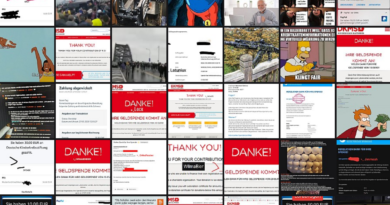Coinhive Exposé Prompts Cancer Research Fundraiser
A story published here this week revealed the real-life identity behind the original creator of Coinhive — a controversial cryptocurrency mining service that several security firms have recently labeled the most ubiquitous malware threat on the Internet today. In an unusual form of protest against that story, members of a popular German language image-posting board founded by the Coinhive creator have vented their dismay by donating tens hundreds of thousands of euros to local charities that support cancer research.
On Monday KrebsOnSecurity published Who and What is Coinhive, an in-depth story which proved that the founder of Coinhive was indeed the founder of the German image hosting and discussion forum pr0gramm[dot]com (not safe for work). I undertook the research because Coinhive’s code primarily is found on tens of thousands of hacked Web sites, and because the until-recently anonymous Coinhive operator(s) have been reluctant to take steps that might curb the widespread abuse of their platform.

One of countless pages of images posted about this author by pr0gramm users in response to the story about Coinhive.
In an early version of its Web site, Coinhive said its service was first tested on pr0gramm, and that the founder(s) of Coinhive considered pr0gramm “their platform” of 11 years (exactly the length of time pr0gramm has been online). Coinhive declined to say who was running their service, and tried to tell me their earlier statement about Coinhive’s longtime affiliation with pr0gramm was a convenient lie that was used to helped jump-start the service by enlisting the help of pr0gramm’s thousands of members.
Undeterred, I proceeded with my research based on the assumption that one or more of the founders of pr0gramm were involved in Coinhive. When I learned the real-life identities of the pr0gramm founders and approached them directly, each deflected questions about their apparent roles in founding and launching Coinhive.
However, shortly after the Coinhive story went live, the original founder of pr0gramm (Dominic Szablewski, a.k.a. “cha0s”) published a blog post acknowledging that he was in fact the creator of Coinhive. What’s more, Coinhive has since added legal contact information to its Web site, and has said it is now taking steps to ensure that it no longer profits from cryptocurrency mining activity after hacked Web sites owners report finding Coinhive’s code on their sites.
Normally, when KrebsOnSecurity publishes a piece that sheds light on a corner of the Internet that would rather remain in the shadows, the response is as predictable as it is swift: Distributed denial-of-service (DDoS) attacks on this site combined with threats of physical violence and harm from anonymous users on Twitter and other social networks.
While this site did receive several small DDoS attacks this week — and more than a few anonymous threats of physical violence and even death related to the Coinhive story — the response from pr0gramm members has been remarkably positive overall.
The pr0gramm community quickly seized on the fact that my last name — Krebs — means “crab” and “cancer” in German. Apparently urged by one of the pr0gramm founders named in the story to express their anger in “objective and polite” ways, several pr0gramm members took to donating money to the Deutsche Krebshilfe (German Cancer Aid/DKMS) Web site as a way to display their unity and numbers.
The protest (pr0test?) soon caught on in the Twitter hashtag “#KrebsIsCancer,” promoted and re-tweeted heavily by pr0gramm members as a means to “Fight Krebs” or fight cancer. According to a statement on DKMS’s Web site, the KrebsIsCancer campaign involved donations from more than 8,300 people totaling 207,500 euros (~USD $256,000).
Update, 2:46 p.m. ET: Updated donation figures per statement posted today on DKMS site.
Tags: cha0s, Coinhive, Deutsche Krebshilfe, DKMS, Dominic Szablewski, KrebsIsCancer, pr0gramm, pr0test
You can skip to the end and leave a comment. Pinging is currently not allowed.

